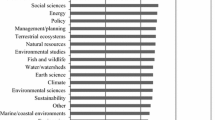Abstract
The need to make young scientists aware of their social responsibilities is widely acknowledged, although the question of how to actually do it has so far gained limited attention. A 2-day workshop entitled “Prepared for social responsibility?” attended by doctoral students from multiple disciplines in climate science, was targeted at the perceived needs of the participants and employed a format that took them through three stages of ethics education: sensitization, information and empowerment. The workshop aimed at preparing doctoral students to manage ethical dilemmas that emerge when climate science meets the public sphere (e.g., to identify and balance legitimate perspectives on particular types of geo-engineering), and is an example of how to include social responsibility in doctoral education. The paper describes the workshop from the three different perspectives of the authors: the course teacher, the head of the graduate school, and a graduate student. The elements that contributed to the success of the workshop, and thus make it an example to follow, are (1) the involvement of participating students, (2) the introduction of external expertise and role models in climate science, and (3) a workshop design that focused on ethical analyses of examples from the climate sciences.
Similar content being viewed by others
Notes
Action Aid is an international non-governmental development organization working for a world free of poverty and injustice. More information about Action Aid can be found at www.actionaid.org.
Most of these principles can be found in ethics text books (e.g., Rachels and Rachels 2010).
References
Børsen Hansen, T. (2003). Between ‘formation’ and paradigm socialisation—draft to a theory of ‘formation’ relevant to chemistry-related university curricula and study programs (In Danish). Ph.D. Danish University of Pharmaceutical Sciences, Copenhagen.
Børsen Hansen, T. (2005). Teaching Ethics to Science and Engineering Students. Report from a follow-up symposium to the 1999 World Conference on Science. Copenhagen, April 15–16, 2005. Copenhagen: Center for the philosophy of nature and science studies.
Carl Friedrich von Weizsäcker—Centre for Science and Peace Research. (2009). Teaching Ethics and Peace to Science and Engineering Students. http://www.znf.uni-hamburg.de/ethics-and-peace.html. Accessed 11 October 2013.
Funtowicz, S., & Ravetz, J. (1993). Science for the post-normal age. Futures, 25(7), 739–755.
Gustafsson, B., Rydén, L., Tibell, G., & Wallensteen, P. (1984). The Uppsala code of ethics for scientists. Journal of Peace Research, 21(4), 311–316.
Joint Quality Initiative. (2004). Shared‘Dublin‘descriptors for short cycle, first cycle, second cycle and third cycle awards: A report from a Joint Quality Initiative informal group. http://www.uni-due.de/imperia/md/content/bologna/dublin_descriptors.pdf. Accessed October 11, 2013.
Kalinowski, M., Spitzer, H., Zandvoort, H., & Børsen, T. (2008). Discussion notes from teaching ethics and peace to science and engineering students, International workshop in Hamburg, October 15–17, 2008. Hamburg: Universität Hamburg.
Kincaid, H., Dupré, J., & Wylie, A. (Eds.). (2007). Value-free science? Ideals and illusions. Oxford: Oxford University Press.
Kuhn, T. (1962). The structure of scientific revolutions (1st ed.). Chicago: University of Chicago Press.
Lieblich, A., Tuval-Mashiach, R., & Zilber, T. (1998). Narrative research: Reading, analysis and interpretation. Thousand Oaks: Sage Publications.
Lomborg, B. (2009). We should change tack on climate after Copenhagen. FT.com Financial Times, December 23. http://www.ft.com/intl/cms/s/0/46455cb4-ef39-11de-86c4-00144feab49a.html#axzz2hPPgBODv. Accessed 11 October 2013.
Merton, R. K. (1942). The normative structure of science. In R. K. Merton (Ed.), 1979. The sociology of science: Theoretical and empirical investigations. Chicago, IL: University of Chicago Press.
Rachels, J., & Rachels, S. (2010). The elements of moral philosophy (6th ed.). New York: McGraw Hill.
Rathje, D., Spitzer, H., Zandvoort, H. (2008). How to prepare students for a responsible use of science and engineering. Results from the workshop “Teaching ethics and peace to science and engineering students”, University of Hamburg, October 15–17, 2008. Hamburg: Universität Hamburg.
Rittel, H., & Webber, M. (1973). Dilemmas in a general theory of planning. Policy Sciences, 4, 155–169.
Singer, F. (2008). Nature, not human activity rules the climate (pp. 26–27). Nongovernmental International Panel on Climate Change. Chicago: The Heartland Institute.
Snow, C. P. (1960). The two cultures and the scientific revolution. Cambridge: Cambridge University Press.
Strand, R. (2004). Teaching reflexivity. In J. Elster & H. von Troil (Eds.), How to best teach bioethics: Report from a workshop March 2003 organised by The Nordic Committee on Bioethics and NorFA (pp. 21–31). Copenhagen: Nordic Council of Ministers.
The Nobel Foundation. (2007). Announcement: The Nobel Peace Prize 2007. Press release, October 12. http://nobelprize.org/nobel_prizes/peace/laureates/2007/press.html. Accessed 11 October 2013.
Wagenschein, M. (1956). Zum Begriff des exemplarischen Lehrens. Weinheim: Beltz.
Wickson, F., & Kjølberg, K. L. (2010). NanoVisions: An experiment with nano-scientists. In A. Ferrari & S. Gammel (Eds.), Visionen der Nanotechnologie. Heidelberg: AKA Verlag.
Acknowledgments
We gratefully acknowledge the participation of Karin Lochte and Andreas Oschlies as senior scientists in our workshop and of Nicolas Kønig as assistant to Tom Børsen. The Cluster of Excellence “The Future Ocean” is financed by an Excellence Initiative of the German Federal Government. We are also grateful for the constructive and critical comments of two reviewers that improved this paper.
Author information
Authors and Affiliations
Corresponding author
Rights and permissions
About this article
Cite this article
Børsen, T., Antia, A.N. & Glessmer, M.S. A Case Study of Teaching Social Responsibility to Doctoral Students in the Climate Sciences. Sci Eng Ethics 19, 1491–1504 (2013). https://doi.org/10.1007/s11948-013-9485-9
Received:
Accepted:
Published:
Issue Date:
DOI: https://doi.org/10.1007/s11948-013-9485-9




